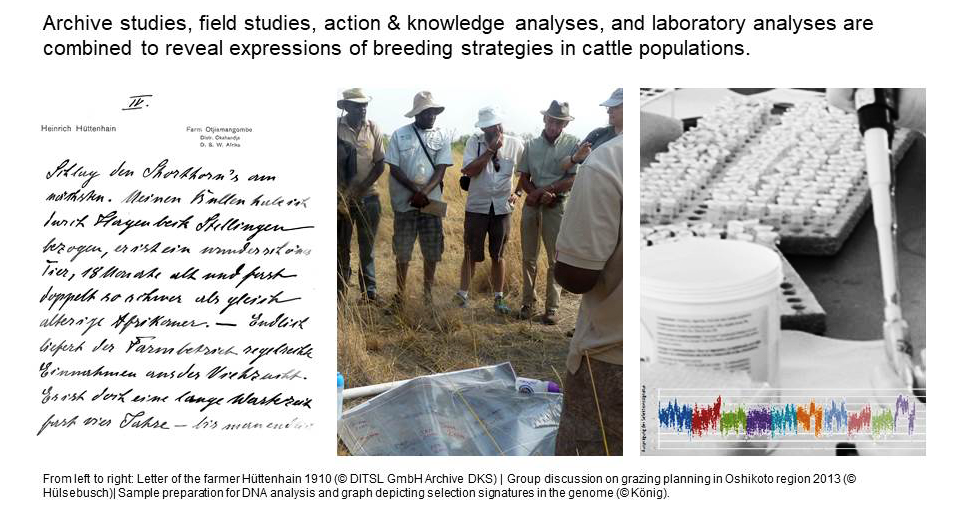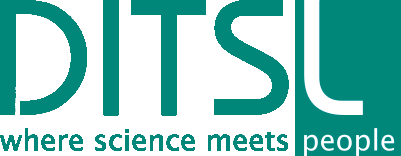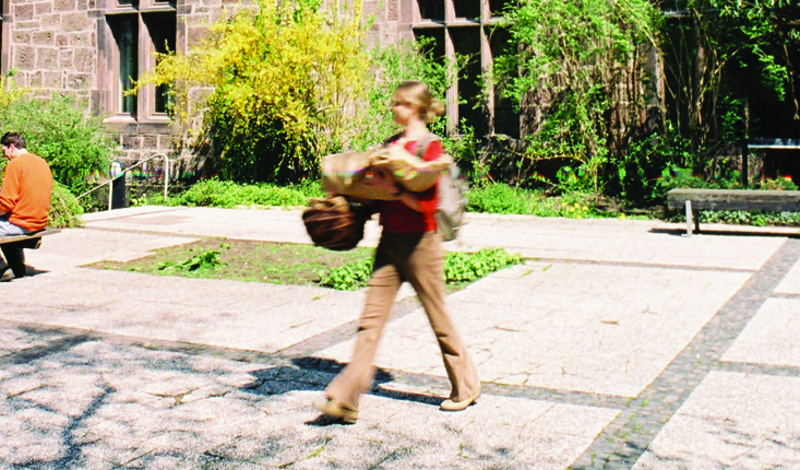deutsche Inhalte
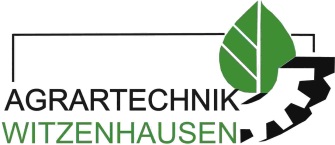 |
 |
 |
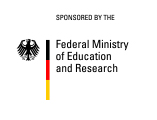 |
Call for Application
ANNOUNCEMENT / CALL FOR APPLICATIONS
On behalf of the German Academic Exchange Service (DAAD) the University of Kassel and DITSL Witzenhausen organize the
International Germany Alumni Seminar 2021:
Organic agriculture in developing countries – quality management along organic agricultural value chains: Production, post-harvest technology, processing, marketing and trade
10 - 15 February 2021 in Witzenhausen, Germany
followed by the
Participation in the BIOFACH 2021
the world´s leading trade fair for organic food
17 - 20 February 2021 in Nuremberg, Germany
Seminar aims
The global market for organic products has been growing continuously for many years, and the demand for healthy, sustainably produced food is increasing, particularly in urban areas worldwide. This creates income opportunities, and offers potential for both, creating local organic value chains and accessing the international export market. But organic is more than a market opportunity, more than a label or certification. Organic stands for unique process quality and the responsible use of nature’s resources.
In fragile agro-ecosystems, organic farming can offer a range of environmental services, such as improved soil fertility, biodiversity, and water cycles. It is successfully being integrated with nature conservation efforts for the mutual benefit of the environment and peoples’ nutrition and health. Organic agriculture has shown a potential to reduce the risk of yield failure, stabilize returns and improve livelihoods and food security, especially in the light of global climate change, thus rendering agricultural systems ecologically and economically more resilient. In addition, organic farming has been shown to create more jobs, with less exposure to hazards, and is frequently also associated with social inclusion.
The high potential of organic farming and food systems face numerous challenges in developing countries when seeking successful access to high value markets. Particularly in remote rural areas with less developed infrastructure, transport and the decentralized provision of clean water and energy to ensure high product quality and reduce losses are often difficult to achieve. In addition, knowledge about local and international certification and quality standards for agricultural products is critical for successful market access.
The seminar will promote exchange between the participants in the field of organic agriculture and value chains, facilitate international scientific cooperation and qualify the participants in the field of quality management along organic agricultural-value chains. The seminar will foster exchange of experiences, establishment of international networks between the participants, scientific discourse on organic agricultural-value chains and international academic cooperation in this field. It will stimulate and promote ideas for joint research, strategy development and knowledge transfer.
The seminar and trade fair participation are offered by the German Academic Exchange Service (DAAD) in the framework of the program Alumni Special Projects (www.daad.de/alumni-special-projects).The International Germany Alumni Seminar is organized and hosted by the Department of Agricultural Engineering in the Tropics and Subtropics of the Faculty of Organic Agricultural Sciences of the University of Kassel (Prof. Dr. Oliver Hensel, www.uni-kassel.de/fb11agrar) and DITSL Witzenhausen (www.ditsl.org). The costs will be mainly covered by funds from the DAAD provided by the German Federal Ministry for Economic Cooperation and Development (BMZ).
The seminar is scheduled in the run-up to the BIOFACH 2021 (www.biofach.de/en ) in Nuremberg, the world’s leading trade fair for organic food. In 2020 over 3,700 exhibitors and 50,000 trade visitors from 136 countries came together to share their passionate interest in organic food, get to know each other and exchange views. As a participating professional you can meet organic producers from the international organic market and source information on recent developments in the organic sector. Successful networking is guaranteed thanks to the multiple experts present.
Seminar topics
- Principles of organic agriculture
- Quality of organic products – quality management systems, quality assessment and food safety standards
- Agricultural value chains in developing countries – reduction of losses (volume / quality / value) and opportunities for additional value creation
- International and national standards for organic products and strategies for export market access
- Marketing of organic products – regional and international value chains and the role of certification and accreditation
- Business plan development
Tentative program
The seminar program in Witzenhausen will include:
- Sessions and workshops
- Presentations from the participating Alumn
- Papers and case studies from invited experts
- Group work activities and group discussions
- Demonstrations and field trials at the Department of Agricultural Engineering in Witzenhausen
- Solar appliances to reduce losses and
The final program in Kassel / Witzenhausen will be published once all applications have been reviewed. It is compulsory for participants to attend the entire programme: seminar, trade fair, social events.
Eligibility criteria for participation
This seminar targets Alumni of German universities
· that are citizens of countries listed on the OECD DAC list (http://www.oecd.org/dac/financing-sustainable-development/development-finance-standards/daclist.htm)
· who spent at least 3 months in Germany on professional errands (study, training, teaching, research)
· who currently live and work in their home countries
You should have
(1) a proven background in academic fields relevant to the topics of organic agriculture and quality management of organic agricultural value chains
(2) professional experience and personal interest in one of the following areas: research, education, NGOs, government agencies, policy making, project development, local communities, and related stakeholders
(3) the requirements to act as a potential multiplier who will present the seminar results in your home country and thus disseminate the acquired knowledge as well as develop ideas and projects for regional implementation
(4) adequate language proficiency which is essential to actively participate in the workshops and discussions as the seminar will be held in English
Eligibility for repeated attendances at Alumni Special Projects:
Participations in Alumni Special Projects are limited to a maximum of 2 participations within 4 years. The year of participation, not the year of application, is decisive for the calculation.
Cost coverage
- International return ticket to Frankfurt and from Frankfurt (lowest possible economy class airfare)
- Train tickets (2nd class): Airport to Witzenhausen – preferably Rail & Fly
- Travel health insurance (max. 30 Euro)
- Visa costs
- Accommodation and partial living expenses (half-board) during the seminar stay in Witzenhausen
- Transport on excursions
- Transport from Witzenhausen to Nuremberg
- Accommodation and partial living expenses during the stay in Nuremberg
- Entrance fees at the trade fair in Nuremberg
- Transport from the hotel in Nuremberg to the departure airport
Please note: Any other than the above costs have to be covered by yourself. This includes particularly:
- Transport between your place of residence and “your” airport
- Travel costs associated with your visa application in your country of residence
- Personal living expenses exceeding the provisions by the program (half-board) in Witzenhausen and Nuremberg
- · Local transport in Germany for private errands not associated with the seminar
Extensions of stays before the seminar / after BIOFACH in Nuremberg are only possible up to 5 working days and upon submission of a comparison of flight ticket prices before you start your travel. You will have to pay any difference between the flight ticket prices for the official arrival / return date (see below) and your actual date of travel before / after your extension. You must also cover by yourself any additional travel costs, subsistence costs and other additional costs of your extension.
Extensions beyond 5 days must be of an official nature which you need to justify, e.g. through visits to universities, organizations, institutions, companies etc. and with details about contact persons and a day-to-day programme of activities. These extensions must be approved by DAAD before you start your travel. Decisions by DAAD are made individually based upon your justification, your programme etc.
For any extension you need to organize your accommodation by yourself, and, very importantly, you have to make sure to have a valid health insurance for the extension days.
Travel dates:
|
9 |
February 2021 |
Arrival in Witzenhausen |
|
10 - 15 |
February 2021 |
Seminar in Witzenhausen |
|
16 |
February 2021 |
Travel from Witzenhausen to Nuremberg |
|
17 - 20 |
February 2021 |
Participation in the trade fair BIOFACH in Nuremberg |
|
21 |
February 2021 |
Departure from Nuremberg |
It is essential that you participate from the first day of the seminar in Witzenhausen to the last day of the trade fair BIOFACH in Nuremberg.
Application procedure
Your application (in English language) must include the following documents in one single pdf file:
- a filled out application form
- a short CV with photograph and relevant documentation of alumni status
- an abstract on “Organic Agriculture in Developing Countries” with reference to the participants' home country and self involvement in the field of organic agriculture and/or organic agricultural value chains (the main topics are listed above; abstracts must not exceed one page; please use font type “Arial”, font size 11, 1.5 line spacing)
- a short description of your present duties / position and your personal professional goals, indicating your envisaged field of activities and duty level
- an overview on seminars, workshops or conferences visited in Germany after finishing your studies in Germany
The PDF-document should be named ‘Last name_First name_country’
(e.g. Anne_Siegmeier_Germany).
Please send your application, as one single pdf file, latest by 27 September 2020 via email to: Diese E-Mail-Adresse ist vor Spambots geschützt! Zur Anzeige muss JavaScript eingeschaltet sein!
Please note: Completeness of personal data mentioned in the online application form will affect your eligibility as a participant.
After the review by the local organizing committee and DAAD, the invited participants will be notified in end-October 2020 at the latest.
The seminar will only take place if COVID-19 restrictions allow international travel without prescribed quarantine and only if the BIOFACH 2021 will take place as scheduled.
For further questions, please contact Anne Siegmeier (Diese E-Mail-Adresse ist vor Spambots geschützt! Zur Anzeige muss JavaScript eingeschaltet sein!).
Witzenhausen, August 2020
Further links:
- German Academic Exchange Service (DAAD)
- Department of Agricultural Engineering University of Kassel
NaviNut project video
Learning Exchanges 2022
Butternut Chapati
Pawpaw Jam
D'ama
Gurdho/Marqa
Mixed porridge
Bunde
Local Food Fair 2021 on Traditional Food Products in Saku,
Marsabit County, Kenya
Local Food Fair on Traditional Food products in Saku, Marsabit County, Kenya
Priority traditional food documented in the commune of Banikoara, Benin
Kpankpannu
Waguaru
Brunsu
Sote Kokoli Yinbe
Kode Balgui
Priority traditional food documented in the commune of Nikki, Benin
Soru Mora
Boïri Lamuni
Sote
Kaha Gbara
Kiaru Bakuru
![]()
(Post-)koloniale Viehzucht in Namibia: Historische, sozio-ökologische und genetische Transformationen
Ein von der Deutschen Forschungsgemeinschaft (DFG) gefördertes Projektpaket
Dieses kollaborative und interdisziplinäre Projektpaket untersucht die Viehzucht in Namibia vom Beginn der Kolonialzeit (1884) bis heute als einen miteinander verflochtenen Prozess historischer, sozio-ökologischer und genetischer Transformationen.
Die Projektpakete werden geleitet von:
- Geschichte: J. Prof. Dr. phil. Stephanie Zehnle
Außereuropäische Geschichte, Historisches Seminar Christian-Albrechts-Universität zu Kiel
- Soziale Ökologie: Prof. Dr. Brigitte Kaufmann, Dr. Christian Hülsebusch
Deutsches Institut für Tropische und Subtropische Landwirtschaft (DITSL), Witzenhausen
- Tierzüchtung: Prof. Dr. Sven König
Institut für Tierzucht und Haustiergenetik Justus-Liebig-Universität Gießen
In Partnerschaft mit:
- UNAM: Universität von Namibia - Universitätsarchiv
- NUST: Namibia Universität für Wissenschaft und Technologie - Bereichsmanagement
- NLAS: Namibia Bibliothek & Archivdienst - Nationalarchiv
- Namibia Ressourcen-Berater
- Earth Wise Enterprise
Die Etablierung kolonialer Systeme in Afrika griff massiv in die afrikanischen Gesellschaften ein und verursachte tiefgreifende Veränderungen der Lebensräume mit ihrer Biodiversität, Ressourcenausstattung und Landnutzung. Die Viehzucht war ein zentrales Element der kolonialen Unternehmungen im heutigen Namibia. Die Absicht der Kolonisatoren zu einer geplanten Transformation war selbst Teil der Legitimation des Kolonialismus und des biologischen Rassismus: Bestehende Viehbestände und Produktionssysteme galten - ebenso wie die afrikanischen Gesellschaften - als verbesserungsbedürftig durch europäische Anleitung. Die kolonialen Entwürfe für die Zukunft beinhalteten die Nutzung lokaler Rassen und die Einführung europäischer Rassen, neue Formen der Tierhaltung und neue Strategien der Land- und Ressourcennutzung. Folglich führte die Kolonialisierung zu einer Diversifizierung der Tierproduktionssysteme mit divergierenden Zuchtzielen und -Ergebnissen. Dies führte zu Transformationsprozessen in Nutztierpopulationen auf phänotypischer und genotypischer Ebene.
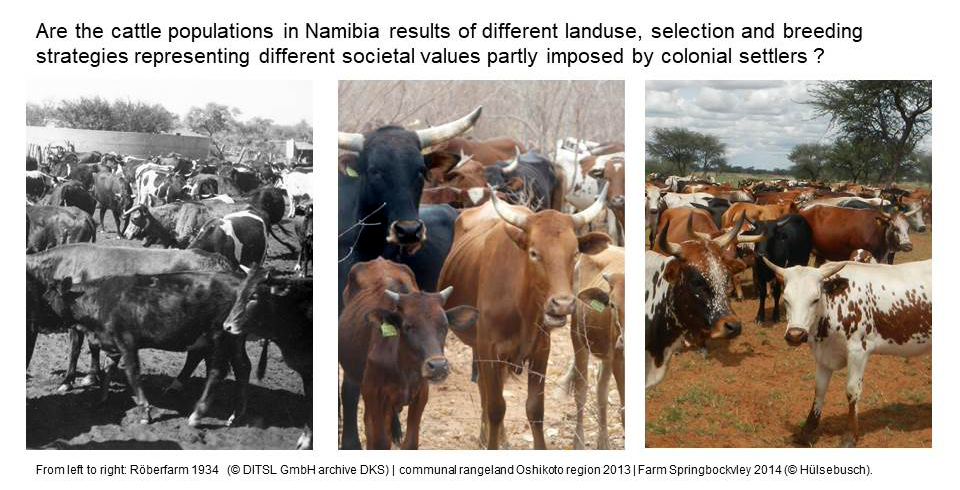
Das Verbundprojekt untersucht die Zusammenhänge zwischen kolonialer Strategieplanung und praktischen Zuchtmethoden sowie die damit verbundenen historischen Veränderungen in der Gesellschaft, in den Mensch-Tier-Beziehungen und in der genetischen Ausstattung von Rinderpopulationen exemplarisch für namibische Rindersystemean verschiedenen Standorten. Unterschiedliche bevorzugte Nutztierphänotypen können als Entwürfe unterschiedlicher gesellschaftlicher Wertesysteme aufgefasst werden, die gesellschaftlich verankert werden mussten. Die daraus resultierenden züchterischen Eingriffe führten jedoch zu einer Mischung aus beabsichtigten und unbeabsichtigten sozialen und genetischen Veränderungen, die sich im Nachhinein nicht leicht trennen lassen. Vor diesem Hintergrund:
Das Geschichtspaket untersucht, nach welchen traditionellen Strategien die koloniale Zucht gesteuert wurde und wie sich die kolonialen Mensch-Tier-Beziehungen angesichts der Zuchtergebnisse veränderten. In einem mikrohistorischen Ansatz untersucht es die afrikanischen Farmen ehemaliger Stipendiaten der landwirtschaftlich orientierten Deutschen Kolonialschule in Witzenhausen und der Kolonialen Frauenschule in Rendsburg. >
Das Social Ecology Package untersucht die Produktionsstrategien, Prinzipien und Handlungslogiken von Viehzüchtern/Pastoralisten in verschiedenen Weidelandsystemen des heutigen Namibia. Es wird untersucht, wie sich diese Logiken entwickelt haben und wie sie unterschiedliche Mensch-Tier-Umwelt-Beziehungen widerspiegeln. >>>
Das Tierzuchtpaket untersucht, inwieweit koloniale gesellschaftliche Veränderungen zur Definition von Zuchtzielen beigetragen haben und inwieweit darauf basierende Zuchtprozesse heute auf der Basis genomischer Daten gemessen werden können. >
Durch diesen interdisziplinären Ansatz werden historische, gesellschaftliche, landnutzungsbezogene und genetische Transformationen anhand eines konkreten Fallbeispiels in direkter Beziehung zueinander untersucht. So soll geklärt werden, ob und wie die landwirtschaftliche Nutzung des Weidelandes durch die Kolonialisierung nachhaltig verändert wurde oder ob und inwieweit sich afrikanische Zucht- und Haltungspraktiken letztlich als resilient erwiesen haben.
